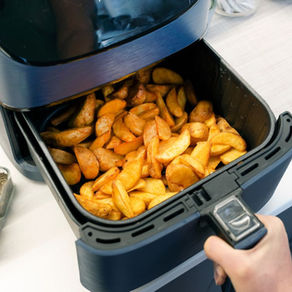
Non-Toxic Airfrying Guide
A Complete Guide to Safe Materials, PFAS-Free Options & Healthier Cooking
Air fryers promise convenience — but choosing the wrong materials can expose your home to unnecessary chemicals. This guide brings clarity, backed by research, so you can cook confidently and avoid common pitfalls.
Why Air Fryer Safety Matters
Air frying can be one of the healthiest ways to cook — fast, versatile, and low-oil.
But not all air fryers are made equal.
Many models still use older non-stick coatings, questionable plastics, or materials that break down at high heat (EPA on PFAS risks). With so many “PFAS-free” or “non-toxic” claims, it’s hard to know what’s real.
This guide cuts through the noise.
You’ll learn:
-
Which materials are actually safe
-
What “PFAS-free” really means
-
Red flags to avoid
-
How to choose a healthier air fryer
-
What brands are doing better
-
When stainless steel or ceramic is worth upgrading
What Makes an Air Fryer “Non-Toxic”?
A truly non-toxic air fryer should meet three criteria:
1. Safe materials inside the basket
Prefer:
-
Stainless steel
-
Ceramic-coated baskets
-
Uncoated metal trays
-
BPA-free or heat-stable plastics used only externally
Avoid:
-
Teflon/PTFE coatings
-
PFAS “forever chemicals”
-
Low-grade plastics near the heating element
2. High-heat stability
Air fryers operate at 350–450°F (175–230°C).
Low-quality coatings begin to degrade at these temps, releasing fumes or micro-particles. (NIH PTFE heat degradation study)
3. Honest transparency from the brand
Look for:
-
Safety testing
-
Clear material disclosures
-
Whether coatings are PTFE-free and PFAS-free (not just one)
-
Whether the basket or tray is dishwasher safe
Ready to upgrade? Explore our curated list of the safest, PFAS-free air fryers.
The 3 Biggest Risks in Air Fryers
1. PFAS / PTFE (Teflon) Coatings
PFAS are “forever chemicals” linked to:
-
Hormonal disruption
-
Immune issues
-
Environmental persistence
Source: EPA PFAS Health Effects
They’re still common in air fryer baskets.
If a listing only says “PFOA-free,” that does NOT mean PFAS-free.
2. Cheap Plastics Near the Heat Source
Some early models emitted a “plastic smell” — often from:
-
Low-grade polymers
-
Inadequate curing
-
Internal components too close to extreme heat
Repeated exposure can transfer smells or break down the plastic over time.
(NIH plastic VOC emissions, Consumer Reports air fryer testing).
3. Chipping Ceramic Coatings
Ceramic coatings are safer than PFAS — but cheap ceramic can chip if:
-
Washed aggressively
-
Scratched with metal tools
-
Exposed to sudden temperature changes
Peer-reviewed research shows durability differences in ceramic coatings
Safe vs. Unsafe Materials (Quick Reference)
-
Stainless Steel — Excellent
Why: Durable, PFAS-free, no coatings.
-
High-Quality Ceramic — Good
Why: PFAS-free, stable at high heat when made by reputable brands.
-
Uncoated Metal Trays — Excellent
Why: Highly durable, no chemical coatings.
-
PFAS/PTFE/Teflon Coatings — Avoid
Why: Break down at high heat and release particles or fumes.
-
Cheap Plastics Inside Cooking Area — Avoid
Why: Can off-gas, warp, or transfer odors when exposed to heat.
-
Silicone Accessories — ️ Mixed
Why: Safe only if 100% silicone. Avoid blends or fillers.
Sources:
FDA Food-Contact Materials
Journal of Hazardous Materials
Consumer Reports
What to Look for When Buying a Safe Air Fryer
1. Confirm the coating
Look for:
-
“PFAS-free”
-
“PFOS-free”
-
“PTFE-free”
️
Reference: EPA PFAS definitions
Avoid vague labels like:
-
“eco coating”
-
“healthy coating”
2. Choose the right basket material
Best:
-
Stainless steel baskets
-
High-quality ceramic-coated baskets (ceramic durability study)
-
Stainless steel crisper trays
3. Check capacity vs. your needs
-
3–4 qt: solo cooking
-
5–6 qt: couples, small families
-
7–10 qt: families, big meals
Cooking for a family? See our picks for the best large-capacity, PFAS-free air fryers.
Best Family Air Fryers (2026) →
4. Look for brand transparency
Good signs:
-
Material sheets
-
PFAS disclosures
-
Replacement parts available
-
Clear cleaning instructions
5. Prioritize easy-to-clean designs
Dishwasher-safe baskets or removable trays reduce damage.
Guidelines reference:
NSF kitchen appliance safety standards
The Safest Types of Air Fryers (Expert Summary)
The Safest Types of Air Fryers (Expert Summary)
Evidence from NSF, FDA, Consumer Reports and material science research.
1. Stainless Steel Interior Air Fryers
High-heat safe, no coatings, durable.
2. Quality Ceramic-Coated Air Fryers
PFAS-free, good for nonstick convenience (choose reputable brands).
3. Oven-Style Air Fryers
Stainless trays, larger capacity, fewer coating risks.
4. Basket Air Fryers (Non-Toxic Options Only)
Prefer:
-
Ceramic-coated baskets
-
Stainless trays
-
PFAS-free certifications
Is Air Frying Actually Healthy?
Yes — when you choose the right materials.
Air frying reduces:
-
Oil consumption
-
Acrylamide (compared to deep frying)
-
Cooking time
-
Smoke (vs. stovetop frying)
Healthier cooking comes from:
-
Lower oil
-
Faster heat exposure
-
Reduced oxidation
-
Even crisping without soaking in fats

How to Clean Your Air Fryer Without Damaging It
Best practices
-
Let cool completely
-
Wipe with a damp cloth
-
Soak basket in warm water + mild soap
-
Use non-abrasive sponges
-
Avoid harsh chemicals (FDA food-contact cleaning guidance)
What to avoid
-
Metal utensils
-
Steel wool
-
Abrasive powders
-
High-temp dishwasher cycles (unless approved)
FAQ
Are all air fryers made of Teflon?
No — newer PFAS-free and ceramic options exist.
Source: Consumer Reports
Is ceramic coating safer than Teflon?
Yes — ceramic is PFAS-free and heat-stable.
(Source: Sol-Gel ceramic study)
Do stainless steel air fryers exist?
Yes — primarily oven-style and premium models.
Stainless steel is FDA-approved.
Is “PFOA-free” the same as PFAS-free?
No — PFAS includes thousands of chemicals.
Ready to Choose a Safe Air Fryer?
For deeper comparisons, brand recommendations, and safe picks:
Explore our main guide:
Healthy Air Fryers for Non-Toxic Cooking
Cooking for a family?
Best Large-Capacity & Family-Size Air Fryers
These guides include:
-
Brand reviews
-
Safety breakdowns
-
PFAS disclosure checks
-
Size comparisons
-
Budget & premium picks
Share this guide



